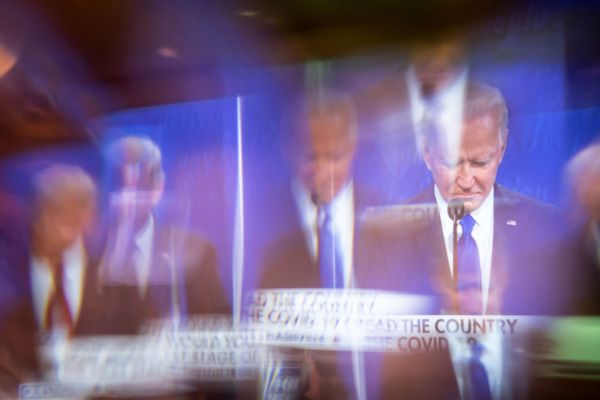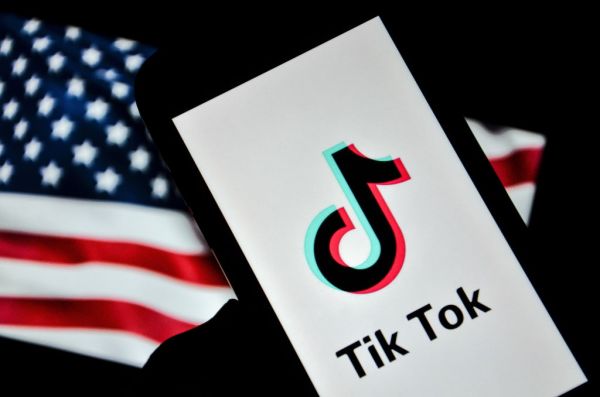Politicians are always surrounded by people. And the more prominent they are, the more people there will be.
A presidential nominee can’t take a step without being swallowed by an entourage: advisers, logistical staff, Secret Service agents, “body men.” In the case of the president himself, there’s even a military attache carrying the nuclear football. For any need the candidate might have, there’s a person in place to see that it’s met.
One of Donald Trump’s needs, for which dedicated personnel are required, is to ensure that he remains inside an information bubble at all times.
On Wednesday, The Bulwark’s Marc Caputo profiled Natalie Harp, a 32-year-old Trump staffer whose political trajectory mirrors that of the broader right since 2016. Harp was born into a religious family and attended Liberty University, a Christian institution that itself has had an interesting trajectory over the last decade. After school, she ended up brain-poisoned by MAGA and became an anchor at One America News, where she told lies about the 2020 election. That qualified her to work for Donald Trump himself, which she now does.
Harp’s job on the campaign is to gatekeep the information that her boss sees. She’s apparently known internally as “the human printer,” because it’s her duty to print out items in the news or on social media that might interest him, and what interests him is being assured constantly that he’s right. When you see Trump on TV outside the courthouse in Manhattan babbling about something Jonathan Turley or Gregg Jarrett just tweeted, that’s almost certainly Harp’s handiwork.
Everyone connected to politics nowadays lives inside an information bubble of some size and heft, but only Trump resides in one so thoroughly that he requires it to physically follow him around.
Another noteworthy story appeared on Wednesday, this one at Bloomberg News. A new poll of battleground states conducted by Morning Consult found that nearly half the voters who live there lack confidence that America will conclude this presidential cycle without violence. Only a bare majority of 51 percent have “some” confidence that it will.
That poll may seem unrelated to Caputo’s piece, but it isn’t. Expectations of political violence have risen because the information feedback loops in which partisans—of all stripes, but especially Republican ones—have placed themselves inescapably encourage radicalization.
On that note, let’s talk about the murder porn that MAGA fans spent Tuesday night indulging in.
On Tuesday, a federal judge unsealed a number of filings in Special Counsel Jack Smith’s classified material case against Trump. There was real news buried in the trove: Allegedly, four separate documents clearly marked “classified” were found in Trump’s own bedroom at Mar-a-Lago, raising the question of how they could have escaped his notice amid his assurances to the FBI that he’d turned over everything.
To MAGA die-hards, though, that wasn’t the newsy revelation in the filings. The newsy revelation was that the FBI was prepared to murder Donald Trump.
Julie Kelly, a well-known MAGA true believer, was mortified by the fact that the operations order for the search warrant served on Mar-a-Lago in 2022 authorized the feds to “use deadly force when necessary.” Elsewhere in the document, she noted, the FBI was told to “be prepared to engage” Melania Trump and the Secret Service if necessary. “Oh my God,” Kelly tweeted.
“Oh my God” was the right reaction, but not for the reasons she thought.
In a matter of hours, populists had transformed Kelly’s misreading—and that’s what it was, as we’ll see—into an honest-to-goodness assassination plot against Trump. “The feds tried to have Trump killed and people are acting like it’s business as usual,” influencer Jack Posobiec complained. “WTF?!! They were prepared to kill me?!” asked Trump attorney Christina Bobb, who was present during the search. (You might recognize Bobb from her recent arraignment in Arizona on charges related to the “fake elector” scam in 2020.)
Baseless freakouts by Very Online grassroots activists are a dog-bites-man story in 2024, but gravity works differently in Trumpworld insofar as B.S. rolls uphill as well as down. By day’s end, the “deadly force” preparations at Mar-a-Lago became bona fide news when the leader of the party himself weighed in about them:
The dregs of Congress got in on the action, too. Rep. Ronny Jackson cited the Justice Department’s conduct during the raid as evidence that “our FBI might as well be part of the North Korean Police State!” Not to be outdone, Rep. Marjorie Taylor Greene declared that “the Biden DOJ and FBI were planning to assassinate Pres Trump”—and wondered what members of her party in Congress intended to do about it.
By Wednesday morning, it was received wisdom in official Republican channels that something outrageous had occurred by authorizing the FBI to shoot people at Mar-a-Lago if necessary. “SICK PEOPLE!”, one official RNC social media account bellowed.
There is some real sickness at work here, I’ll concede.
Everything that’s disgusting about populist political culture is present in this incident.
There’s paranoia, which in this case is so grossly misplaced that it’s hard to believe it’s in earnest. Numerous experts with federal law enforcement experience, including our own Sarah Isgur, chimed in to explain that the “deadly force” language in the operations order is boilerplate whenever the FBI serves a search warrant. Because the agents carry guns, there needs to be some formal instruction on when they are and aren’t allowed to use them. Simple as that.
As usual, Trumpists are mistaking equal treatment under the law for their guy with unfairness.
Read through the actual document, in fact, and you’ll see that much of it is devoted to forbidding the use of force in circumstances when an agent isn’t being threatened, such as when a suspect is fleeing. The feds are entitled to shoot when their lives are in danger, of course, but then so are you. And let’s face it: In light of recent history, it’s quite reasonable for a cop to want to protect himself when confronting a group of rabid Trump loyalists.
As for the “assassination plot,” the Washington Post reported last year that the FBI went out of its way to make sure that the search would be as non-confrontational as possible—up to and including making sure Trump wasn’t present when it happened. “The search would take place when Trump was in New York and not in Palm Beach; the Secret Service would receive a heads-up a few hours before FBI agents arrived to avoid any law enforcement conflict; and agents would wear white polo shirts and khakis to cut a lower profile than if they wore their traditional blue jackets with FBI insignia,” the paper explained about the operation’s planning.
The “heads-up” mentioned there is surely what was meant by “engagement” in the operations order that Julie Kelly mistook as referring to a gunfight, needless to say. The FBI wasn’t preparing to gun down Melania Trump and shoot it out with the Secret Service. They were preparing to coordinate with them so that the search could take place as unobtrusively as possible.
Which is par for the course in all this. It’s Trump himself, not the Justice Department, that’s strained to escalate their dispute.
You may recall it was Trump—not the DOJ—who first alerted the world to the fact that the search had taken place. Just like it was Trump, not the DOJ, who forced this standoff in the first place by refusing to simply hand over the classified material as asked. That’s another populist pathology at work here: Trump and his fans have inflamed an anodyne federal request to return some missing documents into a civic crisis to feed their martyrdom complex, all while insisting that their opponents are the ones being inflammatory. It’s like an arsonist finding it “suspicious” that the fire department always seems to be present when a fire is raging.
When history writes this chapter, the DOJ’s great mistake with Trump will be that it was too timid about prosecuting him, not too aggressive.
Paranoia and obsessive self-victimization are the chief populist frailties here, but there are others. Like grifting, of course.
This episode is a can’t-miss opportunity to make a buck off of suckers who’ll believe anything about their political opponents, no matter how idiotic. Trump’s campaign has risen to the occasion by fundraising off the non-troversy replete with language, like “You know they’re just itching to do the unthinkable…” If you’re willing to sell the Bible at a mark-up, logically you’ll also be willing to make an Oral Roberts-style plea that only a big pile of money can prevent your imminent death.
There’s also vengeful demagoguery of erstwhile political allies with whom there remain scores to be settled. A number of Trump sycophants with long memories about this year’s presidential primary latched onto a dopey theory on Tuesday that Florida Gov. Ron DeSantis was somehow in cahoots with the DOJ about its “assassination plot” at Mar-a-Lago. The revolution always eats its own, and an incident like this couldn’t be allowed to pass without placing DeSantis on the menu for the “disloyalty” he showed by challenging Trump.
There’s lots of self-contradiction too. I wonder if a single Trump supporter will try to reconcile his demands for “absolute immunity” from criminal prosecution for former presidents with their own fury at Joe Biden’s allegedly murderous designs on their hero. Do we or don’t we want a rogue executive to fear justice if he considers eliminating a political enemy?
Digesting all of that, one inevitably wonders if Tuesday’s hysteria is more a product of stupidity or malice. Is this a case of influential populists genuinely not knowing how the FBI operates or have they chosen deliberately to withhold the truth from their readers? Is it ignorance of the truth or a willing lie?
Stupidity or malice? “Both!” a Dispatch reader might reply. Neither, I would argue.
To ask the question is to misunderstand the nature of propaganda. Whether the assassination plot is true or not hasn’t even crossed the minds of most of the people hyperventilating about it, I’d bet.
Propaganda doesn’t concern itself with what’s true, it concerns itself with what’s useful. And the “deadly force” freakout is clearly useful in certain ways to Trump’s cause.
It knocks the revelations about the classified material in his bedroom off the front page. It gooses Republicans’ motivation to vote in November. It primes the pump for Trump to gut the Justice Department in a second term and replace its leadership with cretins like Ronny Jackson and Marjorie Taylor Greene. And it reinforces the creeping fascist belief on the right that American institutions have grown so sinister and corrupt that political allegiance is properly owed to Trump himself, not to the constitutional order.
Propaganda doesn’t concern itself with what’s true, it concerns itself with what’s useful. And the “deadly force” freakout is clearly useful in certain ways to Trump’s cause.
Indifference to the truth, not stupidity or malice, is the hallmark of the propagandist. There might be something sinister about the FBI preparing for deadly force at Mar-a-Lago or there might not be. What does it matter? The real question is, what does that have to do with helping Trump win?
I’ve always believed that that’s where Trump ended up psychologically in 2020 on the question of whether or not the election was really rigged. Initially, he seemed to be lying about it; by January 6, he appeared to sincerely believe that he’d been robbed. The likely truth is that he wasn’t sure and concluded that it didn’t matter a whit to his purposes. He wanted to stay in power and to do so he needed to convince a critical mass of Americans that he’d been cheated.
To ask “but was he cheated?” is beside the point.
In a movement like Trump’s, everything is ultimately a question of loyalty, including elementary factual disputes. For a MAGA die-hard, whether the FBI truly had lethal designs at Mar-a-Lago will be less a matter of careful discernment of the available evidence than a test of credibility between Joe Biden and the Justice Department on the one hand and Donald Trump on the other, just as the allegations about cheating were in 2020. “Truth,” again, is determined by what’s useful, not what’s factually correct.
Which brings us back to Natalie Harp.
An elegant description of her place in the Trump universe came on Wednesday from American Enterprise Institute fellow Brent Orrell, who put it this way: “Trump survives by his will. No matter what happens or how bad the news is or what kind of mistake he’s made, he wills his way through it. Natalie Harp’s work is essential. She feeds the will machine through constant reinforcement of the illusions it needs to carry on.”

Feeding the “will machine” by reinforcing the illusions it needs to carry on is precisely the point of contrived populist outrages like the phantom assassination plot. More grandly, it’s the point of right-wing media writ large. Every day, thousands of populist content creators play the same role for their readers that Harp plays for Trump, maintaining a thick information bubble inside which their prejudices are affirmed in all particulars. Hard truths from the likes of Sarah Isgur have no hope of penetrating; merciless gatekeeping is essential to maintaining the smooth operation of a “will machine.”
Manufacturing political will is what the “deadly force” panic is all about. Many Americans, including many Republicans, are destined to feel jittery at some point this year about reelecting Trump. Even if he wins, many of them will feel jittery next year about his plans for dismantling “the deep state” by purging law enforcement officers who don’t place allegiance to the president above other civic priorities. The right’s political will is going to be tested, and might plausibly falter—unless it’s fed.
The illusion that the FBI is out to kill Trump aims to feed it by convincing Republicans that American politics has crossed a threshold of decency in which the more ruthless party will prevail. If his enemies are willing to deputize federal agents to murder him, the right will need to support forms of ruthlessness that it hadn’t previously condoned in the name of neutralizing that threat.
That means mustering and maintaining the political will to support Trump no matter how illiberally he behaves. And it might mean more than that.
“‘Joe Biden tried to have Donald Trump killed’ is a belief that’s going straight to core storage for a big, big number of increasingly radicalized Republicans,” our old friend Andrew Egger tweeted today. “It doesn’t take a lot of imagination to see how that ends in tears.” That’s correct, and that’s why I’m less optimistic about avoiding violence after the election than the respondents in the Bloomberg News poll I mentioned earlier. You don’t show people murder porn of the sort MAGA is peddling today unless you’re hoping for a primal reaction.
And you can’t convince those people that they’re overreacting if you can’t puncture the information forcefield that a million Natalie Harps have created for them.
Populism has created a monster that’s feral by disposition, blindly loyal to a moral degenerate, and indifferent to whether its own beliefs are true so long as they’re useful in manufacturing political will. However much contempt you have for it, it’s not enough.








Please note that we at The Dispatch hold ourselves, our work, and our commenters to a higher standard than other places on the internet. We welcome comments that foster genuine debate or discussion—including comments critical of us or our work—but responses that include ad hominem attacks on fellow Dispatch members or are intended to stoke fear and anger may be moderated.
With your membership, you only have the ability to comment on The Morning Dispatch articles. Consider upgrading to join the conversation everywhere.